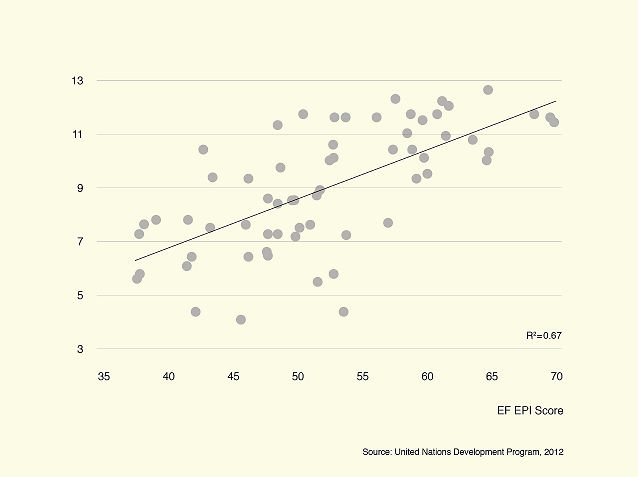Last November, EF Learning Labs released the 2014 EF English Proficiency Index (EPI). In the EPI’s fourth edition, EF illustrates the English language skills of 750,000 non-native English speaking adults spread across 63 countries.
I scanned the report, browsing through each country’s EPI score, but what became most interesting to me was how each score correlated with the strength of a country’s economy and international business success. With a stathead-like approach, EF Learning Labs examined how English language skills impact the economy, education and daily living on a global level.
Four Northern European countries – Denmark, Sweden, Finland and Norway – ranked within the top 5, with each country scoring in the Very High Proficiency range. Europe as a whole displayed the strongest results and rounded out the top 10. Although Asia displays the most varying results – Malaysia ranking #11 to Cambodia ranking #61 – they also show some of the fastest growing scores, as countries like Indonesia, Thailand and Vietnam increasingly improve. Indonesia in particular, stands almost even with Japan and now outranks Taiwan and Hong Kong.
The Economic Intelligence Unit (EIU), an independent forecasting business within The Economist Group, surveyed 572 executives from multinational companies in 2012. Almost half of the executives admitted that cultural misunderstanding and language barriers prevented their companies from seeing growth, particularly executives in Brazil (70%) and China (61%). Almost unanimously, 90% of the executives believe that their company’s revenue and market share would increase if communication improved with potential investors and customers outside of their domestic borders.
Understandably, an ongoing challenge for non-native English speaking countries is determining how to properly implement English language training programs while not hurting the country’s identity and primary language.
Average Years of Schooling and EF EPI Score
Political policies and cultural customs will often determine how an educational system is organized within a country. As you can imagine, this creates vast academic diversity throughout the world. Despite this however, the EPI illustrates that one thing remains consistent – English proficiency scores and years of school are directly correlated. So, an increase in average years of schooling connects with stronger English proficiency, while less schooling equals lower proficiency.
Although traditional forms of education have helped increase proficiency, success also points to technology having a significant impact on improving English skills. New online learning options make it easier to access language training tools, while also making it easier to learn and practice the language without time or scheduling restrictions.
Gross National Income per Capita (USD) and EF EPI Score
Aligning English with classroom curriculums and integrating online learning tools not only makes it easier to learn English, but also helps increase a country’s economic growth and ability to cultivate new business. Language and cultural differences can pose challenges to companies looking to successfully grow outside of their domestic borders. Consequently this has led to companies, like Samsung and Nokia, adopting English as a corporate language in order to compete internationally and differentiate themselves from competition.
The EPI shows a clear connection between higher levels of English proficiency and financial success. Data specifically illustrates a higher gross national income amongst countries where non-native English speakers show stronger English language skills. Higher gross national income allows for governments to invest further in English training, creating a cycle that continues to progressively improve a country’s English proficiency and economic standing for generations to come.
To download or learn more about the EPI, visit https://www.ef.edu/epi/. For non-native English speakers, you can now contribute to the next EF EPI report by taking EFSET – the world’s first free standardized English test.
Related articles



